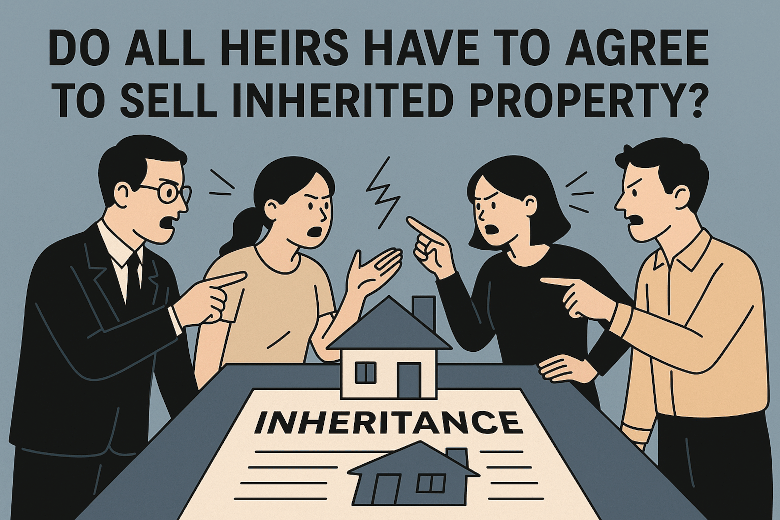Jump to Section
Summary
When multiple heirs inherit a home or land, disputes can arise over what to do with the property. Whether it’s selling, keeping, or renting out the estate, consensus among heirs is often necessary. This article explains how co-inherited property works, what happens if one heir refuses to sell, and the legal options available under U.S. law.
- All heirs must usually agree to sell inherited property if they share equal ownership.
- If one or more heirs refuse, a partition action can force the sale through the courts.
- Buyouts between heirs are common to resolve disagreements amicably.
- Real estate attorneys help ensure the property is divided or sold legally.
- State-specific laws may impact the process, particularly in places like California, Florida, and Texas.
Overview
When someone dies and leaves real estate to multiple heirs, all parties named in the will—or identified through intestacy laws—typically share ownership as tenants in common. That means each heir has an undivided interest in the whole property, but no single heir has exclusive rights to any part of it. Selling or transferring that property usually requires unanimous agreement. When heirs disagree, it can cause legal gridlock, sometimes requiring court intervention to resolve.
Common Challenges
- One heir wants to keep the house: Emotional attachment can block the sale.
- Heirs live in different states: Communication and coordination can become difficult.
- Unclear title or unresolved estate: Property can’t be sold until probate is completed or title is clarified.
- Heir refuses to sign documents: Transactions are stalled until a court forces action.
Step-by-Step Process
1. Determine Ownership Type
Most inherited properties are held as tenants in common, meaning all heirs have equal rights to use or sell. Each can sell their share, but not the entire property without agreement from others.
2. Discuss the Sale
Gather all heirs to discuss the future of the property. If everyone agrees, you can move forward with a sale through a real estate agent or estate attorney.
3. Offer a Buyout
If one or more heirs want to keep the property, they can offer to buy out the others’ shares. This requires a professional appraisal to ensure fairness.
4. File a Partition Action (If Needed)
If no agreement is reached, any heir can file a partition action in court. This is a lawsuit that forces the sale or division of the property. While sometimes expensive, it’s often the only legal remedy when heirs won’t cooperate.
5. Distribute Sale Proceeds
Once the property is sold, proceeds are divided among heirs based on their ownership share, after any liens, taxes, and costs are deducted.
FAQs
Can one heir stop a property sale?
Yes, but not permanently. If they refuse to cooperate, the other heirs can go to court and ask a judge to order the sale.
What is a partition lawsuit?
A partition lawsuit allows one or more co-owners to legally force the sale of shared property. It’s often the only solution when heirs can’t agree.
Do all heirs have to sign closing documents?
Yes. Title cannot transfer until all owners sign the necessary documents—unless a court orders the sale through a partition.
Can heirs rent out inherited property?
Yes, but all heirs should agree to the terms. Income is typically split according to ownership shares.
What if the deceased had unpaid property taxes?
The estate or the heirs must pay back taxes before selling or transferring the property.
Expert Tips
- Get a title search: Ensure there are no legal encumbrances or disputes tied to the property.
- Use a neutral appraiser: Fair market value avoids conflict when one heir wants to buy out others.
- Communicate in writing: Keep a paper trail to avoid miscommunications or later legal disputes.
- Hire a probate or real estate attorney: Legal advice helps prevent costly mistakes.




